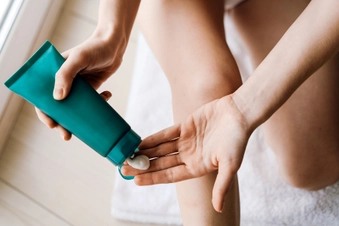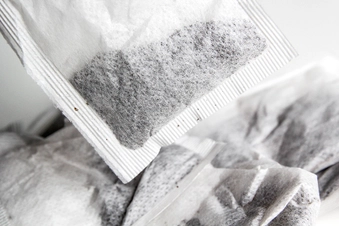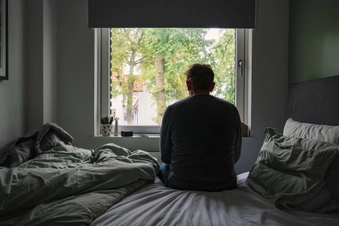Taking the Journey of Atopic Dermatitis One Step at a Time

Tips for Your Eczema Journey
Living with atopic dermatitis (AD), the most common type of eczema, can lead to physical and mental challenges. There’s no cure for it, but there are things you can do to relieve symptoms that affect more than 9.6 million children and about 16.5 million adults in the United States.

Keep Tabs on Triggers
Track your triggers so you can better manage flares. Stress, foods, extreme temperatures, or environmental irritants can make atopic dermatitis worse, so keeping a journal or using the EczemaWise app can make it easier to stay on top of triggers and symptoms so you can see patterns emerge and possibly thwart a flare.

Pick the Right Products
Stick with non-soap, fragrance-free cleansers for washing your skin. Add an extra rinse cycle when you do laundry, and use fragrance-free detergents. Not sure how to find the right products? Look for the National Eczema Association Seal of Acceptance (SOA) on items. The SOA product directory lists skin care products, cleaners, clothing, and other household items that are safe for use with eczema.

Shorten Your Shower Time
"Shorten your time in the shower to 5-7 minutes and make sure to apply emollients when you get out, when the skin is slightly wet," says Emma Guttman-Yassky, MD, PhD, a dermatology professor at the Icahn School of Medicine at Mount Sinai. A wet wrap can lock in moisture after a shower or bath. Put damp clothing or gauze on moisturized skin followed by a dry layer for a few hours or overnight.

Moisturize, Moisturize, Moisturize!
"For all my atopic dermatitis patients, the first thing I recommend is starting with the bathing routine. I recommend showering with lukewarm water for no more than 10 minutes and using a mild cleanser, says Lauren Henderson, MD, a dermatologist near Atlanta. She says, "I also recommend moisturizing within 30 minutes of showering to seal in moisture and prevent extremely dry skin."

Seek Out Help
"While some atopic dermatitis can be managed at home on your own, be sure to seek professional advice for flares and more moderate to severe cases, " says Mary Alice Mina, MD, a dermatologist in the Atlanta area. "Atopic dermatitis can affect sleep, stress, one's mental health, and physical health. Your dermatologist can help prescribe medication and treatments to help control the inflammation. You don't have to suffer alone!"

Flare-up Help: Maybe Tea?
A diluted black tea compress can help facial eczema flares, says Peter Lio, MD, a clinical assistant professor in dermatology at Northwestern University who sits on the board of the National Eczema Association. "Although the mechanisms … have not yet been studied, black tea is known to contain astringent substances (tannins) and flavonoids that both possess anti-inflammatory properties."

Medication Matters
Over-the-counter and prescription treatments are available, and new ones are coming. Danilo C. Del Campo, MD, a Chicago-based dermatologist, says there's exciting research on biologics targeting the cytokine IL-31, which is linked to itching. "Don’t lose hope – there are already great solutions, and even more are on the way," Del Campo says.

Watch Your Mental Health
Atopic dermatitis affects more than your skin – it can cause anxiety and affect body image. Adults with eczema have about a threefold higher risk for anxiety or depression, which goes up as the disease gets worse. Find a support group or see a therapist if your atopic dermatitis seems to affect your mental well-being.

Remember, This Is Your Journey
"The most important is to make sure your [atopic dermatitis] journey is true to you, don't compare yourself to anyone else," says Ashley Wall, an eczema warrior and advocate.
Show Sources
IMAGES PROVIDED BY:
- Science Photo Library/Getty Images
- iStock/Getty Images
- Moment/Getty Images
- iStock/Getty Images
- Moment/Getty Images
- The Image Bank/Getty Images
- Moment/Getty Images
- iStock/Getty Images
- DigitalVision/Getty Images
- E+/Getty Images
SOURCES:
Peter Lio, MD, clinical assistant professor in dermatology, Northwestern University.
Danilo C. Del Campo, MD, dermatologist, Chicago Skin Clinic.
Emma Guttman-Yassky, MD, PhD, dermatology professor, Icahn School of Medicine, Mount Sinai.
Mary Alice Mina, MD, dermatologist, Atlanta, Georgia.
Lauren Henderson, MD, dermatologist, Austell, Georgia.
Ashley Wall, atopic dermatitis patient and advocate.
National Eczema Association: "Atopic Dermatitis," "20 Lifestyle and Health Hacks for Controlling Eczema," "About the Seal of Acceptance," "Eczema Product Directory," "New Prescription Treatments," "Examining Mental Health Between Eczema Flares."
National Eczema Society: "Skin infections and eczema," "Living with eczema."
Allergy & Asthma Network: "Coping with Eczema."